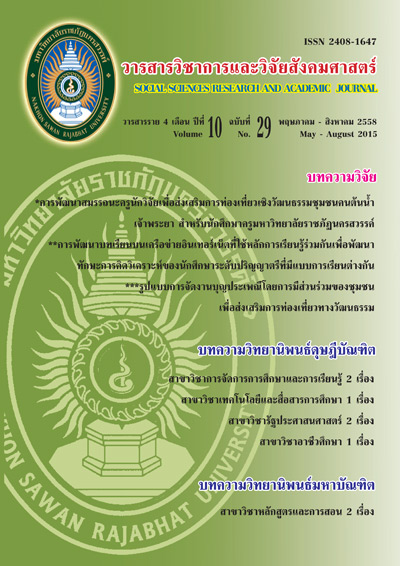กระบวนการสร้างความปรองดองในสังคมไทยตามรูปแบบพุทธวิธีการชำระอธิกรณ์;THE PROCESS OF RECONCILIATION IN THAI SOCIETY IN LINE WITH BUDDHIST APPROACH TO SETTLEMENT OF LEGAL PROCESSES
Main Article Content
Abstract
บทคัดย่อ
การวิจัยครั้งนี้มีวัตถุประสงค์ดังนี้ 1) เพื่อศึกษาหลักพุทธธรรมในคัมภีร์พระไตรปิฎก อรรถกถา วรรณกรรมทางพระพุทธศาสนา และผลงานวิชาการเกี่ยวกับพุทธวิธีการชำระอธิกรณ์ 2) เพื่อศึกษากระบวนการสร้างความปรองดองที่ปรากฏในบริบทสังคมโลกและสังคมไทย และ 3) เพื่อกำหนดรูปแบบกระบวนการสร้างความปรองดองในสังคมไทยตามรูปแบบพุทธวิธีชำระอธิกรณ์ ดำเนินการวิจัยครั้งโดยการศึกษาเอกสารเกี่ยวกับจากคัมภีร์พระไตรปิฎก อรรถกถา วรรณกรรมทางพระพุทธศาสนา และผลงานวิชาการเกี่ยวกับพุทธวิธีการชำระอธิกรณ์ในยุคปัจจุบัน และการสัมภาษณ์เชิงลึก จากผู้ให้ข้อมูลสำคัญ ประกอบด้วย ผู้ทรงคุณวุฒิในด้านพระพุทธศาสนา ด้านรูปแบบพุทธวิธีการชำระอธิกรณ์ และผู้ทรงคุณวุฒิด้านการสร้างความปรองดอง จำนวน 16 ท่าน เครื่องมือที่ใช้ในการวิจัย ได้แก่ แบบบันทึกเอกสาร และแบบสัมภาษณ์แบบมีโครงสร้าง วิเคราะห์ข้อมูลโดยการวิเคราะห์เนื้อหาและสรุปเชื่อมโยงประเด็นสำคัญนำเสนอข้อมูลแบบพรรณนาความ ผลการวิจัย พบว่า
1. หลักพุทธธรรมได้แบ่งประเภทปัญหาของความขัดแย้ง (อธิกรณ์) ไว้ 4 ประเภท ดังนี้ 1) ปัญหาการทะเลาะวิวาทกับเรื่องพระธรรมวินัย เรียกว่า วิวาทาธิกรณ์ 2) ปัญหาการใส่ร้ายป้ายสี ฟ้องร้องกันด้วยเรื่องอันหาเหตุมิได้ เรียกว่า อนุวาทาธิกรณ์ 3) ปัญหาการละเมิดกฎเกณฑ์น้อยใหญ่ เรียกว่า อาปัตตาธิกรณ์ 4) ปัญหาเรื่องพิธีกรรมและปัญหาการลงโทษผู้กระทำให้สำนึกผิด เรียกว่า กิจจาธิกรณ์
2. กระบวนการสร้างความปรองดองที่ปรากฏในบริบทสังคมโลกและสังคมไทยเมื่อกล่าวโดยรวม
มี 4 ประการ ดังนี้ 1) การเยียวยาทางจิตใจ 2) การใช้กระบวนการยุติธรรมเชิงสมานฉันท์ 3) การเล่าความจริง
4) การชดเชย ซึ่งกระบวนการเหล่านี้สามารถนำมาใช้ได้ระดับหนึ่งแต่ยังไม่สามารถสร้างความปรองดองและระงับยับยั้งปัญหาความขัดแย้งในสังคมไทยได้ทั้งหมดโดยสิ้นเชิง
3. รูปแบบการสร้างความปรองดองในสังคมไทยโดยการประยุกต์นำพุทธวิธีการชำระอธิกรณ์มาใช้ในสังคมไทยให้บังเกิดผลได้อย่างแท้จริงนั้น ประกอบด้วย 1) รูปแบบการแก้ไขปัญหาการทะเลาะวิวาท 2) รูปแบบการแก้ไขปัญหาการใส่ร้ายป้ายสีหรือการฟ้องร้องกันด้วยเรื่องอันหาเหตุมิได้ 3) รูปแบบการแก้ปัญหาการละเมิดกฎเกณฑ์น้อยใหญ่ และ 4) รูปแบบการแก้ปัญหาพิธีกรรมและปัญหาการลงโทษผู้กระทำผิดให้สำนึกผิด
Abstract
This thesis had objectives as 1) to study Buddhadhamma existed in Tipitaka and, commentary texts, related Buddhism documents and academic texts on Buddhist settlement of legal processes; 2) to study the reconciliation construction process applied in global and Thai society context; and 3) to propose the reconciliation process patterns in Thai society in line with Buddhist settlement of legal processes. The research methodology involved was qualitative research approach. The data analysis was carried out both through Tipitaka and commentary texts on Buddhism documents, present academic texts on Buddhism allegation process, and through in depth 16 experts of interviews from which the key informants were 3 groups, namely 1) the experts on Buddhism 2) The experts on Buddhist patterns of settlement of legal processes and 3) the experts on reconciliation construction. The research tool used the structured interview method. The research results revealed that
1. The Buddhadhamma set 4 types of legal process: 1) Contention concerning the Dhamma and the Discipline; called Vivadadhikarana; 2) Legal questions concerning accusation called Anuvadadhikarana; 3) Legal questions concerning offence called Apattadhikarana; 4) Legal questions concerning obligation
2. The reconciliation construction processes existed in global and Thai society contexts in general were
1) mental remedy; 2) harmonized justice process; 3) factual narration; 4) compensation. These 4 processes were found to be applied in a certain level but not in all cases of reconciliation construction or disputes dissolved for Thai society.
3. The pattern of reconciliation construction applied for Thai society in line with Buddhist settlement of legal processes consisted of: 1) Two means of dispute solution to bring reconciliation 2) The verdict of innocence
3) The verdict of major and minor rule violation led to reconciliation and 4) Verdict of ritual violation and of who admitted led to reconciliation.


